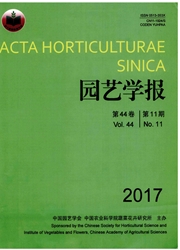

 中文摘要:
中文摘要:
利用反向序列标签重复技术(inverse sequence-tagged repeat,ISTR),对柿属7个种,包括柿(Dios Fyroskaki Thunb.)、君迁子(D.lotus L.)、浙江柿(D.glaucifoliaMetc.)、油柿(D.oleifera Cheng.)、金枣柿(D.sp.)、老鸦柿(D.rhombifolia Hemsl.)和美洲柿(D.virginiana L.)共32个基因型进行了种质鉴定和亲缘关系研究。结果表明:ISTR可区分供试柿属植物中的30份;ISTR能够很好地适用于柿属植物亲缘关系分析;供试的中国与日本原产柿种质分别聚类;新发现的中国甜柿变异类型与日本甜柿的亲缘关系较远且存在较丰富的遗传变异,可能是潜在的育种资源。ISTR标记可在柿属植物种质资源鉴定和亲缘关系分析中更广泛地应用。
 英文摘要:
英文摘要:
Inverse sequence-tagged repeat (ISTR) molecular marker was employed to investigate genetic relationships of 32 genotypes representative of 7 species including Diospyros katki Thunb. , D. lotus L. , D. glaucifolia Metc. , D. oleifera Cheng. , Jinzaoshi (D. sp. ), D. rhombifolia I-Iemsl. and D. virginiana L. ISTR showed good discriminatory power between genotypes, with exception of one bud mutation and its original variety. The clustering results derived from ISTR molecular data was in good agreement with the previous studies or known genetic relationships of some genotypes, indicating that ISTR could be applied for the genus of Diospyros. Both unweighted pair-group method with arithmetic averages (UPGMA) and principal coordinated analysis (PCOA) results separated Japanese persimmon into different groups, indicating their different genetic background. The new found several Chinese native PCNA varieties showed abundant genetic diversity based on ISTR analysis, as well as with Japanese native PCNA types, suggesting that they may be potential and precious breeding materials. In summary, ISTR would be a potential efficient tool for further germplasm differentiation, genetic diversity assessment and phylogenetic analysis in Diospyros.
 同期刊论文项目
同期刊论文项目
 同项目期刊论文
同项目期刊论文
 期刊信息
期刊信息
